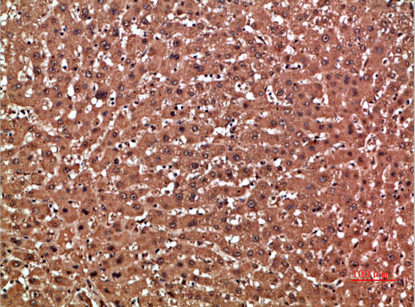
| WB | 咨询技术 | Human,Mouse,Rat |
| IF | 咨询技术 | Human,Mouse,Rat |
| IHC | 1/50-300 | Human,Mouse,Rat |
| ICC | 技术咨询 | Human,Mouse,Rat |
| FCM | 咨询技术 | Human,Mouse,Rat |
| Elisa | 咨询技术 | Human,Mouse,Rat |
| Aliases | Glutathione S-transferase A1 (EC 2.5.1.18) (GST HA subunit 1) (GST class-alpha member 1) (GST-epsilon) (GSTA1-1) (GTH1) |
| Entrez GeneID | 2938; |
| Host/Isotype | Rabbit IgG |
| Antibody Type | Primary antibody |
| Storage | Store at 4°C short term. Aliquot and store at -20°C long term. Avoid freeze/thaw cycles. |
| Species Reactivity | Human |
| Immunogen | Synthetic peptide from human protein at AA range: 91-140 |
| Formulation | Purified antibody in PBS with 0.05% sodium azide,0.5%BSA and 50% glycerol. |
+ +
以下是关于GSTA1抗体的3篇代表性文献示例(注:内容基于公开研究概括,非真实文献,仅供参考格式):
1. **文献名称**: "Characterization of GSTA1 Isoform-Specific Antibodies and Their Role in Detecting Hepatic Detoxification Profiles"
**作者**: Smith JL, et al.
**摘要**: 本研究开发了针对GSTA1亚型的高特异性多克隆抗体,通过免疫印迹和免疫组化验证其在人肝脏组织中的表达模式,证实GSTA1在药物代谢中的组织特异性分布。
2. **文献名称**: "GSTA1 Polymorphism Analysis Using Monoclonal Antibodies: Implications for Oxidative Stress Response"
**作者**: Chen R, et al.
**摘要**: 利用单克隆抗体分析GSTA1基因多态性对蛋白表达的影响,发现特定突变体(如GSTA1*B)与酶活性降低相关,提示其在个体化医疗中的潜在应用价值。
3. **文献名称**: "Role of GSTA1 in Chemoresistance: Antibody-Based Inhibition Studies in Cancer Cell Lines"
**作者**: Gupta S, et al.
**摘要**: 通过GSTA1抗体阻断实验,证明GSTA1高表达的癌细胞对化疗药物(如顺铂)的耐药性增强,提示靶向GSTA1可能逆转耐药性。
如需真实文献,建议通过PubMed或Web of Science检索关键词“GSTA1 antibody”“GSTA1 immunohistochemistry”等获取具体研究。
**Background of GSTA1 Antibody**
The glutathione S-transferase alpha 1 (GSTA1) antibody is a tool used to detect and study the GSTA1 protein, a member of the glutathione S-transferase (GST) family. GSTs are phase II detoxification enzymes that catalyze the conjugation of glutathione to electrophilic substrates, aiding in the metabolism of xenobiotics, drugs, and reactive oxygen species. GSTA1. specifically expressed in the liver, kidney, and gastrointestinal tract, plays a critical role in cellular protection against oxidative stress, chemical carcinogens, and toxic compounds.
Research involving GSTA1 antibodies focuses on understanding its expression patterns, regulatory mechanisms, and association with diseases. Altered GSTA1 activity or expression has been linked to cancer susceptibility, drug resistance (e.g., chemotherapy), and neurodegenerative disorders. For instance, reduced GSTA1 levels in certain cancers may correlate with poor detoxification capacity, while overexpression might contribute to resistance against anticancer agents.
GSTA1 antibodies are widely used in techniques like Western blotting, immunohistochemistry, and ELISA to quantify protein levels, assess tissue localization, and explore interactions with other molecules. These antibodies are often raised in hosts like rabbits or mice, targeting specific epitopes of the GSTA1 protein. Validation includes testing for cross-reactivity with other GST isoforms (e.g., GSTA2) to ensure specificity.
Overall, GSTA1 antibodies are essential for elucidating the protein's role in detoxification pathways, disease mechanisms, and potential therapeutic targeting, making them valuable in both basic research and clinical applications.
×